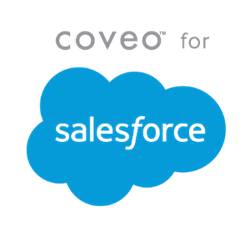Industry's First Analytics & AI-Powered Enterprise Search
Coveo, a provider of intelligent search technology, announced an increase in GAAP revenues by more than 80% as compared to CY2015. In fact, in 2016, the company also experienced substantial team growth, adding 100 employees, to reach a total of 300 employees worldwide.
 Coveo CEO Louis Tetu said, "As demand increases for intelligence everywhere and we continue to scale our operations, it is critical that we keep our amazing culture and work ethic. The passion that we share, the collaboration that we cultivate, and the integrity with which we conduct business both internally and towards the marketplace, along with the great diversity of our employees, are the sources of our innovation and success with customers. This we must never forget."
Coveo CEO Louis Tetu said, "As demand increases for intelligence everywhere and we continue to scale our operations, it is critical that we keep our amazing culture and work ethic. The passion that we share, the collaboration that we cultivate, and the integrity with which we conduct business both internally and towards the marketplace, along with the great diversity of our employees, are the sources of our innovation and success with customers. This we must never forget."
Coveo 2016 in Review
Coveo didn’t only achieve impressive financial results, but also collected multiple technology awards throughout the year, due to the company's success in machine learning, analytics, and intelligent cloud search. However, more importantly, the company stepped up its game in partner expansion. Coveo now has more than 40 leading system integrator (SI) partners in the Digital CX area and more than a dozen leading partners in the Salesforce ecosystem.
The largest Sitecore technology partner, Coveo and Sitecore's first Global Platinum implementation partner Avanade, the digital innovator on the Microsoft platform, announced a global partnership. Built on the Sitecore Experience Platform, Avanade’s cloud-based Digital Marketing Managed Services includes Coveo Intelligent Search apps for Sitecore, enabling Sitecore customers to deliver the most relevant, contextual digital customer experiences.
Prior to this partnership, Coveo rolled out a new Sitecore native search app, Coveo for Sitecore Pro Cloud  Edition and a new version of its native, on-premise Sitecore integration, Coveo for Sitecore v4.0. With the release of Coveo for Sitecore 4.0, the provider has taken a significant leap forward, both in terms of architecture and capabilities. The new cloud edition is the first and only cloud-based intelligent site search app with native integration to Sitecore, which simplifies the architecture as the vendor now provides a web-based interface for viewing search analytics and making configuration changes that instantly distribute to the indexes.
Edition and a new version of its native, on-premise Sitecore integration, Coveo for Sitecore v4.0. With the release of Coveo for Sitecore 4.0, the provider has taken a significant leap forward, both in terms of architecture and capabilities. The new cloud edition is the first and only cloud-based intelligent site search app with native integration to Sitecore, which simplifies the architecture as the vendor now provides a web-based interface for viewing search analytics and making configuration changes that instantly distribute to the indexes.
In September 2016, as our news contributor Barb Mosher Zinck reported, here at CMS-Connected, Sitecore kicked off its annual user conference with two big product announcements: version 8.2 of its Experience Platform and a new Sitecore Enterprise Cloud Edition from search partner Coveo. With this new version of Coveo announced, Sitecore enabled customers to push all their content into the Coveo cloud where it can be used to create better search experiences, provide predictive recommendations and leverage xDB personalization. According to Coveo’s website, there are over 300 joint customers between the two, along with many Systems Integrators with expertise in both platforms.
Coveo also integrates with Sitecore Commerce to provide relevant offers and product recommendations, to leverage profile information and visit behavior and profiles based on like visitors. Integration between Sitecore, Coveo, and Sitecore Commerce can also improve the relevancy of the content offered on an e-commerce website, according to Barb Mosher Zinck. “Consumers are far more demanding of the brands they buy from than ever before. Sitecore is focused on helping brands deliver rich, contextualized shopping experiences for their consumers. Coveo helps make this possible." says Ryan Donovan, SVP, Product Management at Sitecore.
According to the company, Coveo AI is the industry's first analytics and machine learning intelligent search and relevance service, and throughout 2016, the product has been beefed up and simplified. The company believes that the main driving factor behind this unprecedented growth in 2016 was Coveo AI, which was launched in 2015 and expanded to all Coveo applications last year.
Another prominent milestone that happened in 2016 was that the Coveo product team began to issue PaaS  offerings. In the wake of this endeavor, a new Developer Service for AI-powered Relevance and Analytics were announced at the Salesforce Dreamforce event in October 2016. Called Coveo Express for Salesforce, it is designed to make it easy for Independent Software Developers (ISVs), Systems Integrators (SIs) and in-house enterprise developers (DevOps), to integrate Coveo to their own Salesforce applications. In addition, Coveo customer Adobe launched in-app search with Coveo, within Adobe Photoshop, bringing easy access to highly relevant information to all Adobe Photoshop users.
offerings. In the wake of this endeavor, a new Developer Service for AI-powered Relevance and Analytics were announced at the Salesforce Dreamforce event in October 2016. Called Coveo Express for Salesforce, it is designed to make it easy for Independent Software Developers (ISVs), Systems Integrators (SIs) and in-house enterprise developers (DevOps), to integrate Coveo to their own Salesforce applications. In addition, Coveo customer Adobe launched in-app search with Coveo, within Adobe Photoshop, bringing easy access to highly relevant information to all Adobe Photoshop users.
Coveo also announced the appointment of Mark Floisand as CMO, reporting to Coveo Chairman and CEO Louis Tetu. Floisand has over 20 years of marketing, sales and general management experience in the enterprise and cloud software industry, spanning blue chip and start-up companies, including Apple, Adobe, BusinessObjects, SAP, and most recently - Sitecore, a Coveo technology partner, where he led product marketing globally. Hot on the heels of this key organizational change, CMS-Connected reached out to Mark Floisand to get his in-depth insight on the various ways to bring enterprise search into play:
Lastly, Coveo announced an investment of $5 million to set up an office in Montreal, expanding beyond its current offices in Quebec City, San Francisco, and Amsterdam. "Our new Montreal office is just the first of our investments in the city," said Coveo CEO Louis Tetu. "We have an amazing pipeline of cloud solutions, and the integration of machine learning, artificial intelligence, and data-driven personalization to our technology creates huge market opportunities. We believe Montreal is the best place for us to build on this momentum and assert our position as market leader. Stay tuned!"
“Google-izing” Enterprise Data
According to the study conducted by Hexa Reports, the global enterprise search market is expected to reach USD 5.02 billion by 2020. Additionally, the global enterprise search market is expected to reach $8.90 billion by 2024, according to a new study by Grand View Research, Inc. A key factor driving market growth over the next six years is to provide time-efficient data search capabilities as the large volume of data management and operational efficiency are the key issues in many organizations.
In short, search is no longer just a way of retrieving information people seek. Even the leading analyst firms have changed what they call enterprise search, illustrating that organizations can retrieve much more information through search interactions. For instance, Gartner now uses the term “Insight Engines” or “Proactive Search” while Forrester calls it “Cognitive Search.” The scope of enterprise search has changed because consumer behavior has also changed. A study by Forrester, for instance, discovered that as many as 72% of customers prefer to use self-help options rather than reach out to a company, as modern customers tend to be self-researchers. It means that consumers are searching your website for more information to get answers to their questions, long before they create contact with sales or a support department. Therefore, today, companies should expand the use of enterprise search as still many organizations are really only scratching the surface in terms of its vast capabilities across all business experience whereas search capabilities can also be utilized to personalize a user's digital experiences.
While the rising magnitude of content is bringing so many opportunities, especially for marketers, sorting out the information needed is getting overwhelming for visitors. And let’s be honest, we all have high expectations for search as we have learned it from Google. Therefore, it is crucial for website owners to implement intelligent search powered by machine learning so the website can learn from the search behavior of previous site visitors to automatically improve the results and experience for everyone. Businesses are looking for enterprise search software that “Google-izes” enterprise data.
During the interview mentioned above, Floisand also made a really good point regarding the mobile devices shift. Since consumers utilize smaller screens than desktops provide, the first or second item on those screens is really what they are looking at. Therefore, it is critical for a mobile experience that the most relevant content be populated to the top regardless of devices. To do so, organizations should make sure that they integrate search technology into every touchpoint where customers interact with the brand, whether in a virtual or physical form across multiple channels.
Search capabilities are pivotal not only for your online visitors but also for employees within the organizations. Given the mass amount of data at our disposal today, searching for specific files or folders alone will no longer satisfy especially, an increasingly millennial-dominated workforce. They have a lower tolerance for hassle and expect to get results that look less like a page of links and more like answers to a question.

Venus Tamturk
Venus is the Media Reporter for CMS-Connected, with one of her tasks to write thorough articles by creating the most up-to-date and engaging content using B2B digital marketing. She enjoys increasing brand equity and conversion through the strategic use of social media channels and integrated media marketing plans.